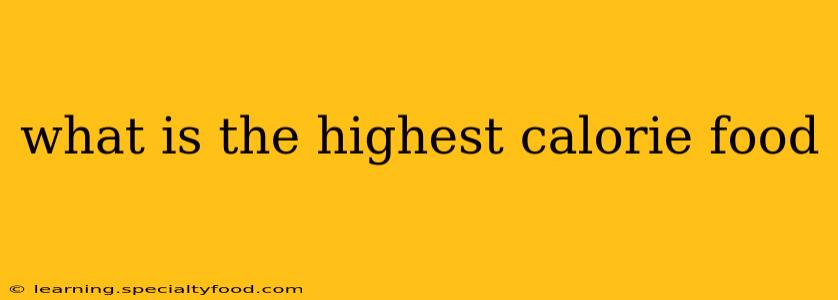Determining the single highest-calorie food is tricky because calorie counts can vary based on preparation methods, portion sizes, and even the specific ingredients used. However, some foods consistently rank at the top when it comes to caloric density. This means they pack a lot of calories into a relatively small volume. Understanding why certain foods are so calorie-dense is key to making informed dietary choices.
What Makes a Food High in Calories?
Before we delve into specific foods, let's understand what contributes to high calorie counts. Calories are a measure of energy. Foods high in calories are typically rich in:
- Fat: Fat contains approximately 9 calories per gram, significantly more than carbohydrates (4 calories/gram) or protein (4 calories/gram). Foods with high fat content naturally have a higher calorie density.
- Carbohydrates: While not as calorie-dense as fat, carbohydrates still contribute significantly. Refined carbohydrates, such as those found in white bread and sugary drinks, are often quickly digested and lead to rapid spikes in blood sugar.
- Sugar: Added sugars are a major contributor to high calorie intake. They often add calories without providing significant nutritional value.
Foods with Extremely High Calorie Density
Several foods consistently score high on the calorie-per-ounce scale. These include:
-
Oils: Oils, whether vegetable, coconut, or olive, are almost pure fat. A tablespoon of oil can easily contain 120 calories or more. While oils offer essential fatty acids, overconsumption can contribute to weight gain.
-
Nuts and Seeds: While nutritious, nuts and seeds are calorie-dense. A small handful can quickly add up to a considerable number of calories. For example, a single ounce of macadamia nuts can contain around 200 calories.
-
Dried Fruits: The dehydration process of dried fruits concentrates the sugars, making them significantly higher in calories than their fresh counterparts. A small serving of dried cranberries or raisins can pack a surprising caloric punch.
-
Fatty Meats: Meats like bacon, sausage, and certain cuts of beef are high in both fat and protein, resulting in a high calorie count per serving.
Is There a Single "Highest Calorie" Food?
There isn't one definitive answer. The title of "highest calorie food" is highly dependent on portion size and preparation. A large, heavily buttered piece of cake will undoubtedly contain more calories than a tablespoon of oil. However, on a per-weight basis, pure oils consistently rank among the most calorie-dense foods available.
How Many Calories Should I Consume?
The ideal calorie intake varies greatly depending on individual factors such as age, gender, activity level, and overall health goals. Consulting a registered dietitian or nutritionist is recommended for personalized guidance on calorie needs. They can help you develop a balanced meal plan that meets your specific requirements.
What About "Empty Calories"?
It's crucial to distinguish between calories from nutrient-rich foods and "empty calories" found in processed foods, sugary drinks, and foods high in unhealthy fats. While all calories contribute to your total energy intake, prioritizing nutrient-rich options is essential for overall health and well-being. Nutrient-rich foods provide vitamins, minerals, and other beneficial compounds alongside their caloric content.
How Can I Manage My Calorie Intake?
Effective calorie management involves a holistic approach:
-
Mindful Eating: Pay attention to your hunger and fullness cues. Avoid distractions while eating and savor your food.
-
Portion Control: Be mindful of serving sizes and use measuring tools to ensure accurate portions.
-
Balanced Diet: Incorporate a variety of nutrient-rich foods, including fruits, vegetables, whole grains, and lean protein sources.
-
Regular Exercise: Physical activity burns calories and contributes to overall health and fitness.
Remember, a balanced approach to nutrition and regular exercise are key to maintaining a healthy weight and overall well-being. Consult with a healthcare professional for personalized advice tailored to your individual needs.
